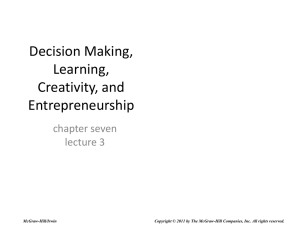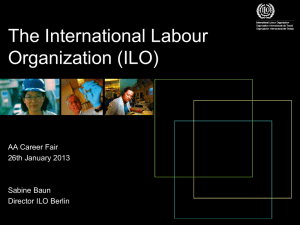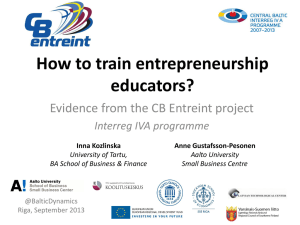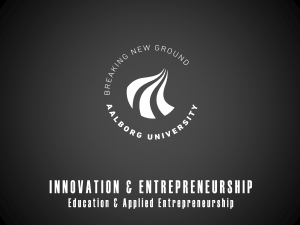Rawan Yasmin AFD-ETF slides - CMI
advertisement
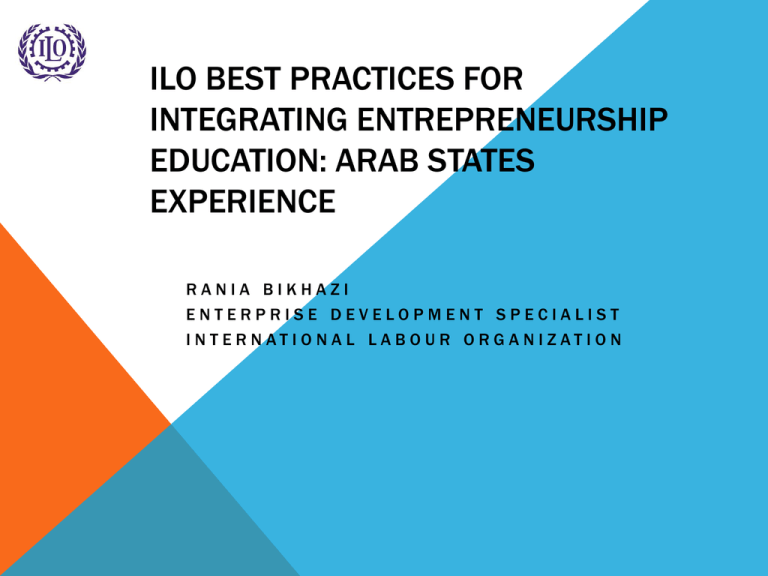
ILO BEST PRACTICES FOR INTEGRATING ENTREPRENEURSHIP EDUCATION: ARAB STATES EXPERIENCE RANIA BIKHAZI ENTERPRISE DEVELOPMENT SPECIALIST INTERN AT IO NA L LABOUR ORG ANIZATION WHY SUPPORT ENTREPRENEURSHIP IN THE MENA REGION? In response to the youth unemployment crisis in the MENA region, SMEs can generate decent job opportunities, facilitate the route of entry for youth into the labour market, contribute to economic development and growth, and speed up modernization with innovative ideas responding to needs. INTEGRATING ENTREPRENEURSHIP EDUCATION: THE ILO EXPERIENCE Levels of Integration • • • Vocational Technical Education • Secondary Vocational Schools • Jordan, Lebanon, oPt, Syria, Oman, Yemen, Iraq, Saudi Arabia General Education • Lebanon Higher Education • Community Colleges/ Universities • Jordan, Yemen MUBADARA PROGRAMME Objectives: 1- Equip educated youth with entrepreneurial skills and attitudes essential at the personal and business level 2- Provide educated youth with fundamental business skills and tools to plan for and establish a sustainable and successful enterprise Target Group: Young men and women enrolled in tertiary education institutions. Methodology: - Delivered in 50 hours in a participatory and interactive approach including case studies, games, and hands-on experiences. - Follow-up with graduates through a business plan competition whereby developed coaches assist students - Financial linkages for youth through partnering with banks to sponsor the business plan competition MUBADARA PACKAGE The Mubadara package includes a trainer’s guide of 11 instructional modules. Module 1 Entrepreneurship Skills Module 2 Entrepreneurial Leadership and Risk-Taking Module 3 Negotiation and Decision Making Skills Module 4 Starting a Business Module 5 Creative Business Ideas Module 6 Viability of Entrepreneurial Ideas Module 7 Marketing Plan Module 8 Operation Plan Module 9 Management Plan Module 10 Financial Plan Module 11 Communication and CSR Strategy INTEGRATION OF THE ILO’S ENTREPRENEURSHIP EDUCATION PROGRAMMES (1) Awareness Raising Phase (2) Material Adaptation & Development (3) Recruitment and selection of teachers (4) Monitoring, Follow-up & Certification (5) Linkages with local financial and non-financial resources INTEGRATING ENTREPRENEURSHIP EDUCATION: ILO EXPERIENCE (1) The awareness raising stage at the national level, including: • Recognition from a national counterpart that there is a need for promoting entrepreneurship and ILO intervention • Readiness to take action and generate funding to implement a project pilot addressing the issue • Partnering with local implementing agencies to foster project ownership and ensure sustainability Engagement of Government National decision to pilot, including: • Appointing project supervisors from governmental bodies • Involvement on the ground Willingness to engage with ILO, assess progress, and draw conclusions Decision to roll out/nationalize, including: • Inclusion in national strategy • Commitment to providing course materials in schools • Fundraising process INTEGRATING ENTREPRENEURSHIP EDUCATION: ILO EXPERIENCE (2) Development of educational materials for the local context and needs: • Efforts to integrate entrepreneurial education began with a successful programme at vocational and technical training institutes in Yemen, Mubadara came as the next project targeting university students. • Development and adaptation of training course material with national stakeholders to contextualize the content • Regular feedback from implementers throughout the programme to modify and finalize context-specific material INTEGRATING ENTREPRENEURSHIP EDUCATION: ILO EXPERIENCE (3) Recruitment of National teachers and trainers • ILO specialists, together with the national counterpart, take part in selecting the teachers who will be partaking in the programme • Screening of teachers , preferentially selecting those who are: • Young (not approaching retirement so they may benefit from new skills), • Of dynamic character and high motivation toward programme goals, • And willing to enhance their teaching skills by developing a new participatory approach with students INTEGRATING ENTREPRENEURSHIP EDUCATION: ILO EXPERIENCE (4) Monitoring, Follow-up & Certification • ILO partakes in the monitoring and follow-up with teachers to ensure the programme is being implemented according to quality standards • Assignment of a programme supervisor from the relevant ministry to perform spotchecks and school visits to assess the teachers • After completion of the ILO requirements, teachers can be certified to deliver the course content to other teachers and become a certified training facilitator. • This process ensures replication of the programme and sustainability with minimal ILO governance INTEGRATING ENTREPRENEURSHIP EDUCATION: ILO EXPERIENCE (5) Linking students with financial and non-financial local resources Business Plan Competition • Engaging and developing coaches from national universities and the private sector • Partnerships with local Yemeni banks to judge and sponsor, allowing many benefits: • Financial linkages for potential entrepreneurs • Advice to link entrepreneurs with the local realities • Promotion of services for banks CHALLENGES FACED DURING IMPLEMENTATION • Teachers’ motivation and background • Financial/Moral incentives • Willingness to develop in their teaching careers • Curricula insertion and availability of teaching hours • Cost of the implementing process • Role of the government • Continuous support of the programme • Sustained involvement in the programme activities SPECTRUM OF AVAILABLE ILO PROGRAMMES THANK YOU FOR YOUR TIME




